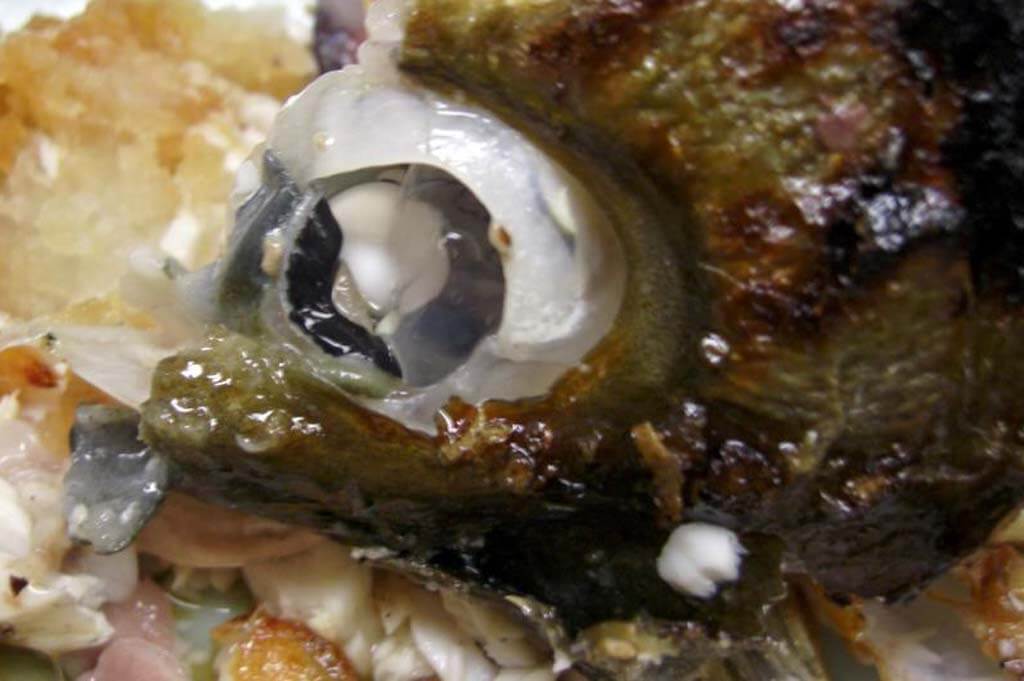When eating fish, you may wonder, “Can You Eat Fish Eyes?” Luckily, these unsavory parts are not forbidden. Many cultures around the world enjoy eating fish eye. Fish eyes can be consumed whole, in a sauce, or even inside the fish head. If you do decide to eat the eye of a fish, be sure to keep the head intact when cooking. Broil, grill, or fry the fish, leaving the eye attached. In most cases, the eye is safe to eat, and the muscle underneath will be edible.

The eyeballs are composed of vitreous humor, a jelly-like substance made up of 99% water and a mixture of hyaluronic acid. Many people choose to remove the eyeball and discard the whole thing, but you should also consider the nutritional value and taste of this delicacy. Fish eyeballs are also a great way to reduce food waste. If you’re wondering how to eat fish eyes, here are some tips:
What Do Fish Eyes Taste Like?
The fish eyeball’s outer layer is gelatinous, while its center has a crunchy texture that releases a sweet, umami-rich flavor. To make sure you get the most nutrition from the fish eyeball, leave it in your mouth for several minutes.
Some experts recommend letting the fish’s eyes sit in the mouth for as long as possible because the fatty part is soft and gelatinous. However, fish eyeballs are still not recommended for vegetarians or vegans.

Most Asian cuisines consider fish eyeballs to be delicacies. Though they are not traditionally served in the United States, many Southeast Asian countries do. In Sri Lanka, for example, the guest of honor will be served the eyeballs of a whole steamed fish.
Some Westerners might be wary of eating them, but many Hispanic and Latino cultures have no problem chowing down on this delicacy.
Is Fish Eyes Edible?
Fish eyeballs are rich in omega-3 fatty acids, vitamin A, phosphorus, magnesium, potassium, calcium, and iron. They also contain a high amount of zinc, iodine, and vanadium, as well as a small amount of fluoride.
Despite their high levels of fat, fish eyes are safe to eat. Many cultures around the world regularly consume fish. It is important to note that, while they are highly nutritious, fish eyeballs are also high in fluoride and chlorine.
In addition to being delicious on their own, fish eyes can be added to pasta dishes and other recipes. Cooking in creamy sauces will help thicken the liquid. You can also add fish eyes to a pasta dish to make it more acceptable. You can also cook them in a French-style sauce. This is a great way to make them more palatable and more attractive.
Maybe you also like: Can You Eat Coconut Crabs
Can You Eat Fish Eyes?
While fish eyes aren’t necessarily the most attractive part of a fish, they are a mild introduction to eating these unsavory parts. They’re rich in omega-3 fatty acids, calcium, phosphorus, magnesium, sodium, and potassium. Fish eyes are also rich in minerals like copper, manganese, and iodine. They’re also loaded with nutrients that can help your heart, eyes, and brain.

Although there’s a debate on whether you should eat fish eyes, you should give them a try. Although fish eyes don’t taste particularly great, they’re high in omega-3 fatty acids, and they have a good flavor. If you’re unsure, try cooking them in a broth or sauce.
The fats and muscles in fish’s eyes act as a carrier for flavor, much like butter. Eating fish eyeballs has been linked to improved memory and cognition. These little gems of fish are also loaded with Vitamin A and Omega-3 fatty acids.
Can You Eat Fish Eyes Raw?
Although fish eyes contain high amounts of mercury, many people are still curious about the texture and taste. You can find them in sushi restaurants and Asian markets, and the meat inside is referred to as sashimi.
They are similar to the texture of beef tongue, and they can be enjoyed in moderation. While not poisonous, they are also packed with protein and vitamins. Here’s what you need to know about fish eyes before you start eating them.
While you can eat fish eyes raw, they are generally more acceptable cooked. While they aren’t toxic to your body, the taste and texture are often subdued when cooked in a cream-based sauce.
The same goes for fish eyeballs added to soups and pasta. You can also grill, sauté, or bake them. Adding fish eyeballs to a cream-based sauce before serving will help reduce the fishy taste. The fats found in fish eyes will help thicken the sauce.
How Do You Cook Fish Eyes?
Fish eyeballs are a delicious and healthy addition to any meal. They are often eaten raw, but cooking them will eliminate their fishy taste and slimy texture. Fish eyes can be fried, sauteed, baked, or even grilled. You can also prepare them as a soup and add them to the final dish. The flavor is much more subdued if cooked in a cream sauce.
While some people are against eating fish eyes, the fact remains that the eyeball is not the only component of a fish eye. Other parts of the eyeball include the ocular system, nerves, and muscles.
If you’re going to cook fish eyes in a recipe, make sure to include the extra parts of the eyeball. Otherwise, the dish will taste too bland! If you’re unsure about the taste of fish eyes, you can ask your fish lover for advice on how to prepare them.
Maybe you also like: How to Fish With Clams As Bait
Are Fish Eyes Nutritious?
Are Fish Eyes Nutritious? You may be surprised to learn that this delicacy is considered a healthy food by many Asians. These eyes are a rich source of omega-3 fatty acids and protein.
They are also a good source of calcium, phosphorus, magnesium, sodium, potassium, iron, copper, manganese, and zinc. These eyeballs also contain iodine, molybdenum, vanadium, nickel, and fluoride. Although they have a strong taste, you should consider cooking them first and avoiding the raw eyes.
The eyeballs of fish are the most nutritious part of the fish, and they can be a tasty and healthy treat. They contain omega-3 fatty acids, vitamin A, and protein in higher concentrations than other parts of the fish.
Fish eyes are a common delicacy in many parts of the world and are even consumed by Russians during their meals. If you are unsure about whether these eyeballs are a healthy food, be sure to consult your doctor first.
Does Eating Fish Eyes Improve Eyesight?
The myth that eating fish eyes improves vision has been around for centuries. However, this is not true. While fish eyes contain vitamins and minerals that are beneficial for our bodies, they do not add any extra eye compounds.
Instead, they strengthen similar body parts. If you want to know if eating fish eyes improves your vision, read on to learn more. You may even be surprised. Read on to discover whether they are worth the extra calories!
Unlike most other parts of the fish, the eyeball of fish contains an abundant supply of protein and omega-3 fatty acids. The eyeball is also rich in vitamin A and is a source of protein.
The entire fish head is also high in protein and contains several beneficial nutrients. Among these are vitamin A and omega-3 fatty acids. As with all other fish parts, fish eyes contain a good dose of vitamins and minerals, making them an excellent addition to any meal.
Are Fish Eyes Good For You?
You may have heard that fish eyes are edible. Although they don’t taste particularly great, you can add them to a dish. They are generally safe to eat and have the same texture and flavor as the rest of the fish.
They are a good source of omega-3 fatty acids and protein. If you’re wondering if they’re good for you, read on to learn more. Alternatively, you can cook the eye of a fish like you would any other part of the fish.
Fish eyeballs contain the highest concentration of vitamins, proteins, and omega-3 fatty acids of any part of the fish. Fish eyeballs are considered a delicacy in many Southeast Asian countries.
They are served as a special treat to the guests of honor. In Russia, for example, fish eyeball soup is served to honor guests. This is because fish eyeballs are rich in unsaturated fats and other nutrients.
Health Benefits Of Eating Fish Eyes
One of the health benefits of eating fish eyes is a lower risk of cancer, particularly those affecting the oral cavity, pharynx, colon, and pancreas. Cancer occurs when the immune system fails to distinguish an external threat from an internal one, resulting in the growth of malignant cells. Eating fish eyes can increase the metabolic process in the body and lower the risk of cancer. This is because they contain omega-3 fatty acids.
They Are Delicious
If you’ve never tried fish eyes before, you’re missing out! The unappetizing part of fish can be an excellent addition to almost any recipe. Although many Western cultures do not eat the fish’s eye, Asian and Slavic cultures do.
Cooking fish eyes properly is an important part of preserving fish, and it’s worth the effort to learn how to prepare it properly. Listed below are some tips for making fish eyes tasty.
As far as fish parts go, fish eyes are a healthy and tasty alternative. They’re high in omega-3 fatty acids and protein. As with other parts of the fish, this part is normally discarded after a certain amount of time.
Besides being delicious, fish eyes are also environmentally friendly. In some parts of the world, they are even considered delicacies! Fish eyes are a great source of protein and omega-3 fatty acids, so you should try them!
Saves Memory Loss
Eating fish eyes can improve your memory, and if you’re worried about the possibility of Alzheimer’s disease, eating fish eyes might be the answer you’re looking for. They are loaded with nutrients that support brain health and memory. In addition, these fish eyes contain a high concentration of omega-3 fatty acids, EPA, and DHA, both of which are necessary for brain health.
In addition to promoting a healthier brain, consuming fish regularly has a neuroprotective effect on the human brain. Eating fish regularly can reduce your risk of a five-year decline in mental skills.
Furthermore, consuming fish regularly can improve your oral health. The more you eat, the less likely you are to develop Alzheimer’s disease. The saline flavor from fish eyes has anti-aging benefits as well, and eating fish regularly will also stimulate your taste buds.
Brain Cell Production
The nutritional benefits of eating fish eyes are many, and Chinese cuisine is famous for it. Eating the fish eyeball regularly stimulates brain cell production and staves off memory loss. The fish head itself is packed with omega-3 and omega-6 fatty acids, vitamin A, and protein.
Chinese people also eat the eyes of their favorite fish, so it makes sense that eating them would be good for the brain. However, before you start devouring this delicacy, make sure to read the health benefits.
The eyeballs of fish are a source of omega-3 fatty acids, vitamin A, and protein, so eating them regularly may help improve your vision and prevent age-related macular degeneration, a common cause of blindness in older people.
While fish eyeballs and other parts of the fish are not considered equal in quality, regular consumption of fish will help you stay healthy and maintain a youthful appearance.
High Nutritional Value
Eating fish eyes is a delicious way to get your daily dose of protein and omega-3 fatty acids. They are also a good source of calcium, phosphorus, sodium, potassium, copper, manganese, and iron. These edible parts are also rich in iodine, molybdenum, vanadium, nickel, fluorine, and selenium.
However, don’t mistake the high nutritional value of fish eyes for the fact that they’re toxic. Using this nutritious part of the fish in your diet may help you cut your risk of colon, pharynx, and digestive cancer.
Low Heart Disease Risk
Fish eyes contain high levels of vitamin A, omega-3 fatty acids, and lean protein. These nutrients are known to reduce the risk of heart disease. Eating fish eyes is also good for memory since they stimulate brain cells. They also taste good, and they retain their high nutritional value. Fish eyes have a similar taste to oysters.
Conclusion
Are you a true fan of fish? If so, you may be wondering if you can eat fish eyes. Fish eyes are not forbidden food. Many cultures have enjoyed eating fish for centuries. Eating fish eyes might even make you smarter. Besides, the taste of these fish parts will stimulate your taste buds. So, the next time you are served fish, make sure you try it first!
As long as you prepare the fish eyeballs properly, you can enjoy a delicious meal full of nutrients. Fish eyes are rich in omega-3 fatty acids and memory-building minerals. These fatty acids help to maintain the grey matter of the brain.
Moreover, they help in lowering the risk of heart disease. And, because they are packed with protein and omega-3 fatty acids, they are considered to be healthy for your brain.














